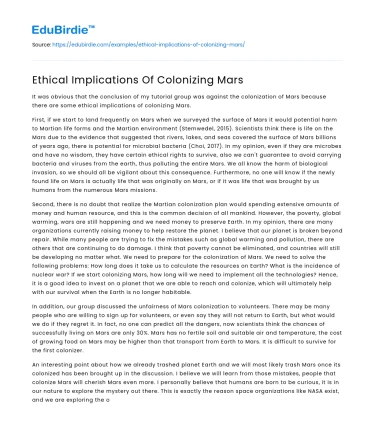It was obvious that the conclusion of my tutorial group was against the colonization of Mars because there are some ethical implications of colonizing Mars.
First, if we start to land frequently on Mars when we surveyed the surface of Mars it would potential harm to Martian life forms and the Martian environment (Stemwedel, 2015). Scientists think there is life on the Mars due to the evidence that suggested that rivers, lakes, and seas covered the surface of Mars billions of years ago, there is potential for microbial bacteria (Choi, 2017). In my opinion, even if they are microbes and have no wisdom, they have certain ethical rights to survive, also we can't guarantee to avoid carrying bacteria and viruses from the earth, thus polluting the entire Mars. We all know the harm of biological invasion, so we should all be vigilant about this consequence. Furthermore, no one will know if the newly found life on Mars is actually life that was originally on Mars, or if it was life that was brought by us humans from the numerous Mars missions.
Second, there is no doubt that realize the Martian colonization plan would spending extensive amounts of money and human resource, and this is the common decision of all mankind. However, the poverty, global warming, wars are still happening and we need money to preserve Earth. In my opinion, there are many organizations currently raising money to help restore the planet. I believe that our planet is broken beyond repair. While many people are trying to fix the mistakes such as global warming and pollution, there are others that are continuing to do damage. I think that poverty cannot be eliminated, and countries will still be developing no matter what. We need to prepare for the colonization of Mars. We need to solve the following problems: How long does it take us to calculate the resources on Earth? What is the incidence of nuclear war? If we start colonizing Mars, how long will we need to implement all the technologies? Hence, it is a good idea to invest on a planet that we are able to reach and colonize, which will ultimately help with our survival when the Earth is no longer habitable.
In addition, our group discussed the unfairness of Mars colonization to volunteers. There may be many people who are willing to sign up for volunteers, or even say they will not return to Earth, but what would we do if they regret it. In fact, no one can predict all the dangers, now scientists think the chances of successfully living on Mars are only 30%. Mars has no fertile soil and suitable air and temperature, the cost of growing food on Mars may be higher than that transport from Earth to Mars. It is difficult to survive for the first colonizer.
An interesting point about how we already trashed planet Earth and we will most likely trash Mars once its colonized has been brought up in the discussion. I believe we will learn from those mistakes, people that colonize Mars will cherish Mars even more. I personally believe that humans are born to be curious, it is in our nature to explore the mystery out there. This is exactly the reason space organizations like NASA exist, and we are exploring the oceans and terrains. Additionally, the location of Mars is perfect for exploration, and it was not a coincidence that it is relatively close to the Earth, and a somewhat perfect distance from the Sun causing it to be habitable.
Works Cited
- Choi CQ. NASA Astrobiology [Internet]. NASA. NASA; 2017 [cited 2019/9/22]. Available from: https://astrobiology.nasa.gov/news/microbes-could-survive- thin-air-of-mars/
- Stemwedel JD. Would It Be Ethical to Colonize Mars? [Internet]. Forbes. Forbes Magazine; 2015 [cited 2019/9/22]. Available from: https://www.forbes.com/sites/janetstemwedel/2015/09/30/would-it-be-ethical-to-colonize-mars/#462457c95015
- Horneck G. Astrobiological Aspects of Mars and Human Presence: Pros and Cons [Internet]. Hippokratia. LITHOGRAPHIA Antoniadis I.-Psarras Th. G.P.; 2008 [cited 2019/9/22]. Available from: https://www.ncbi.nlm.nih.gov/pmc/articles/PMC2577400/






 Stuck on your essay?
Stuck on your essay?

